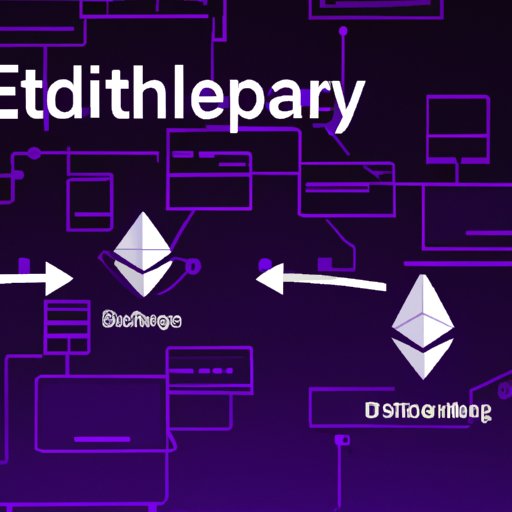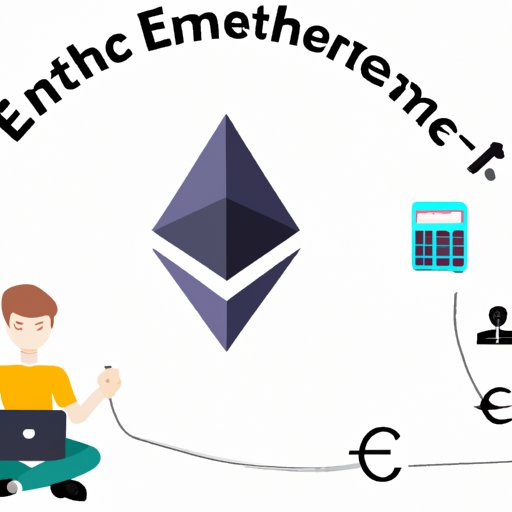Introduction
Ethereum is a decentralized blockchain platform that enables developers to create and deploy decentralized applications (Dapps) and smart contracts. It has become one of the most popular cryptocurrencies in the world and its potential uses are far-reaching. In this article, we’ll explore what Ethereum can be used for, including developing decentralized applications, leveraging smart contracts, tokenizing assets, making payments and transactions, and more.
Overview of Ethereum
Ethereum is an open-source, public, blockchain-based distributed computing platform and operating system featuring smart contract functionality. It was created in 2015 by Vitalik Buterin and other co-founders. Ethereum is built on the same blockchain technology as Bitcoin, but it is designed to enable developers to build and deploy decentralized applications and smart contracts that can run on the Ethereum network. Ethereum also has its own cryptocurrency, Ether, which is used to power the network and pay for transaction fees.
Benefits and Risks of Investing in Ethereum
Investing in Ethereum can be a great way to diversify your portfolio, as it offers investors access to a new asset class. Ethereum is also highly liquid and relatively low-risk, making it attractive to investors. However, there are some risks associated with investing in Ethereum, such as market volatility, regulatory uncertainty, and hacking. Therefore, investors should always do their due diligence before investing in any cryptocurrency.

Developing Decentralized Applications with Ethereum
Decentralized applications (Dapps) are applications that run on a decentralized network such as Ethereum. They are built on top of existing blockchain protocols and leverage the underlying technology to provide users with enhanced security, privacy, and scalability. Dapps are becoming increasingly popular, as they offer the potential for developers to create innovative applications without having to rely on a centralized entity or service provider.
What is a Decentralized Application?
A decentralized application (Dapp) is a type of software application that runs on a decentralized network, such as Ethereum. Unlike traditional apps, Dapps don’t rely on a centralized server or service provider. Instead, they are powered by a distributed ledger, such as Ethereum’s blockchain, and are secured using cryptography. This means that users can trust the application, as it is virtually impossible to hack or manipulate the data stored on the blockchain.
Advantages of Using Ethereum for Dapps
Ethereum provides developers with a powerful platform for creating and deploying decentralized applications. It is secure, scalable, and easy to use, making it an ideal choice for developers looking to make an impact in the blockchain space. Ethereum also provides developers with access to a wide range of tools and resources, such as Solidity and Truffle, which can help them create and deploy Dapps quickly and efficiently.
Challenges to Building Dapps on Ethereum
Building Dapps on Ethereum can be challenging, as the technology is still relatively new and evolving. Developers need to have a deep understanding of the underlying technology in order to be successful. Additionally, Ethereum’s blockchain is not yet fully developed, which means that it can be slow and expensive to process transactions. Finally, Ethereum is subject to high levels of volatility, which can make it difficult for developers to predict how their applications will perform over time.
Smart Contracts
Smart contracts are self-executing contracts that are written into code and stored on a blockchain. They are designed to automatically execute certain tasks when specific conditions are met. These tasks can range from transferring funds to executing complex legal agreements. Smart contracts are becoming increasingly popular, as they offer a secure and efficient way to manage digital assets and execute transactions.
What are Smart Contracts?
A smart contract is a computer protocol that allows two parties to enter into a binding agreement without the need for a third party. The terms of the agreement are written into code and stored on a blockchain, such as Ethereum’s. When the conditions of the agreement are met, the smart contract automatically executes the agreed-upon tasks. This eliminates the need for manual intervention and makes it easier to enforce agreements between two parties.
How Ethereum Enables Smart Contracts
Ethereum is the most popular platform for deploying smart contracts. It provides developers with a powerful platform for building and deploying decentralized applications. Its blockchain is secure, immutable, and tamper-proof, making it an ideal choice for deploying smart contracts. Additionally, Ethereum’s virtual machine, known as the Ethereum Virtual Machine (EVM), is designed to enable developers to write and deploy smart contracts quickly and easily.
Potential Uses of Smart Contracts
Smart contracts have a wide range of potential uses, from facilitating financial transactions to automating legal agreements. For example, smart contracts can be used to securely transfer funds between two parties, execute complex legal agreements, facilitate the exchange of digital assets, and manage digital identities. Smart contracts can also be used to manage supply chains and automate business processes, such as payroll and invoicing.
Tokenization and Asset Management
Tokenization is the process of converting a real-world asset into a digital token that can be stored, transferred, and managed on a blockchain. Tokenization has the potential to revolutionize the way we manage and trade assets, as it makes it easier to track and transfer ownership rights. Ethereum plays a key role in enabling tokenization, as it provides developers with the tools and resources needed to create and deploy tokens and asset management systems.
Advantages of Tokenizing Assets
Tokenizing assets offers numerous advantages, such as increased liquidity, reduced transaction costs, improved transparency, and enhanced security. Tokenization also makes it easier to track and transfer ownership rights, as all transactions are recorded on a public ledger. This makes it easier for buyers and sellers to negotiate, as they can easily verify the authenticity of the asset being traded.
Ethereum’s Role in Tokenization
Ethereum is the most popular platform for tokenizing assets. It provides developers with a powerful platform for creating and deploying tokens and asset management systems. Ethereum’s blockchain is secure, immutable, and tamper-proof, making it an ideal choice for tokenizing assets. Additionally, Ethereum’s virtual machine, known as the Ethereum Virtual Machine (EVM), is designed to enable developers to write and deploy tokens quickly and easily.
Benefits of Asset Management on Ethereum
Asset management on Ethereum offers a number of benefits, such as improved security, increased transparency, and lower transaction costs. Additionally, Ethereum’s smart contracts can be used to automate asset management processes, such as dividend payments, voting rights, and asset transfers. This makes it easier for asset managers to manage their portfolios and keep track of their investments.
Payments and Transactions
Ethereum is increasingly being used for payments and transactions, as it offers a secure, fast, and cost-effective way to send and receive funds. Ethereum’s blockchain is secure, immutable, and tamper-proof, making it an ideal choice for payments and transactions. Additionally, Ethereum’s native currency, Ether, is highly liquid, making it easy to convert into other currencies.
Ethereum’s Potential for Payments
Ethereum’s blockchain is secure, immutable, and tamper-proof, making it an ideal choice for payments and transactions. Additionally, its native currency, Ether, is highly liquid, making it easy to convert into other currencies. This makes Ethereum an attractive option for merchants, as it offers a secure, fast, and cost-effective way to process payments.
Leveraging Ethereum for Transactions
Ethereum’s blockchain can also be used for non-payment transactions, such as transferring digital assets or managing digital identities. This makes it an ideal choice for businesses looking to streamline their operations and reduce costs. Additionally, Ethereum’s smart contracts can be used to automate processes, such as dividend payments and asset transfers, further streamlining operations.
Security Concerns with Ethereum Payments
Although Ethereum is a secure platform, there are still some security concerns associated with using it for payments. It is important to remember that Ethereum is still a relatively new technology, and there have been some high-profile hacks in the past. Therefore, it is important to take steps to secure your funds, such as using strong passwords and two-factor authentication.
Conclusion
Ethereum is a powerful platform for developing decentralized applications, leveraging smart contracts, tokenizing assets, making payments, and more. It provides developers with access to a secure, immutable, and tamper-proof blockchain, as well as a suite of tools and resources for building and deploying applications. Ethereum’s potential for disrupting the current financial system is immense, and it is likely to continue to grow in popularity in the coming years.
Summary of Ethereum’s Uses
Ethereum is a powerful platform for developing decentralized applications, leveraging smart contracts, tokenizing assets, making payments, and more. It provides developers with access to a secure, immutable, and tamper-proof blockchain, as well as a suite of tools and resources for building and deploying applications. Ethereum’s potential is immense, and it is likely to continue to grow in popularity in the coming years.
Final Thoughts on Ethereum
Ethereum is one of the most popular and versatile blockchain platforms available today. It has the potential to revolutionize the way we manage digital assets and execute transactions, and its potential for disruption is immense. As the technology continues to evolve and mature, it is likely that Ethereum will become even more widely adopted in the future.
(Note: Is this article not meeting your expectations? Do you have knowledge or insights to share? Unlock new opportunities and expand your reach by joining our authors team. Click Registration to join us and share your expertise with our readers.)
